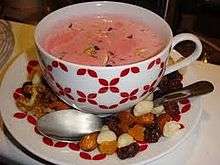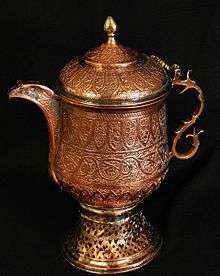Noon Chai

Noon Chai (also called Kashmiri tea, pink tea,[1] Gulabi chai and Sheer Chai) is a traditional tea beverage from Kashmir.[2] It is a part of Kashmiri culture to drink this beverage 2−3 times a day with traditional Kashmiri breads and pastries like lavasa, sheermaal, kandir tchot, bakarkhani and kulcha.
Etymology
The word noon means salt in several Indo-Aryan languages such as Kashmiri, Bengali, Punjabi, Rajasthani and Nepali.[3] It is used in several other terms in the Indian subcontinent, such as the noon-dab ("salt promise") custom of Rajasthan, where a hand is dipped in salt to signify a solemn promise.[4]
Preparation

Noon chai is traditionally made from special tea leaves, milk, salt, and cooked in a samavar.[5] A pinch of baking soda is added to help give it more of a pronounced pink color. A recent variant preparation of this tea also includes sugar but it is not traditionally consumed in Kashmir. Noon chai is also served in many parts of Pakistan, often with sugar and nuts,[5] at special occasions, weddings, and during the winter months when it is sold at many kiosks.
See also
References
- ↑ "NOON CHAI / SALTY TEA / PINK TEA – KASHMIRI NAMKEEN CHAI". Life 'n' Such. April 16, 2007. Retrieved 17 February 2014.
- ↑ "Sheer Chai Recipe". Archived from the original on 2012-07-06.
- ↑ Bengali and English dictionary. Oxford University. 1856. Retrieved 2014-11-22.
... নূণ Salt ...
- ↑ Edward Balfour (editor) (1873). Cyclopædia of India and of Eastern and Southern Asia, Volume 4. Scottish & Adelphi presses. Retrieved 2014-11-22.
... Noon-Dab, Hind., from Noon or loon, salt, and dabna, to dip, bespatter, or sprinkle, a custom among the Rajput races, of dipping the hand in the salt; the Noon-dab, is the most sacred pledge of good faith ...
- 1 2 "Noon Chai Recipe and History at Life-n-Such". Lifensuch.com. 2007-04-16. Retrieved 2012-03-04.